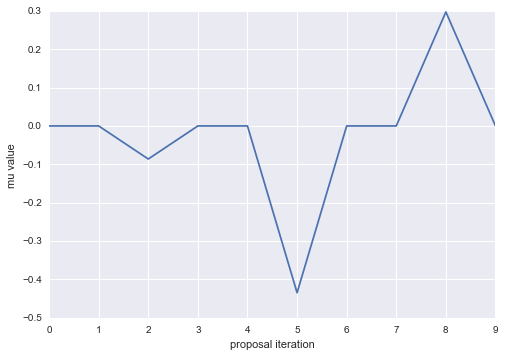How to debug a model¶
There are various levels on which to debug a model. One of the simplest is to just print out the values that different variables are taking on.
Because PyMC3 uses Theano expressions to build the model, and
not functions, there is no way to place a print statement into a
likelihood function. Instead, you can use the Theano Print
operatator. For more information, see: theano Print operator for this
before:
http://deeplearning.net/software/theano/tutorial/debug_faq.html#how-do-i-print-an-intermediate-value-in-a-function.
Let’s build a simple model with just two parameters:
In [1]:
%matplotlib inline
import pymc3 as pm
import numpy as np
import matplotlib.pyplot as plt
import seaborn as sns
import pandas as pd
import theano.tensor as T
x = np.random.randn(100)
with pm.Model() as model:
mu = pm.Normal('mu', mu=0, sd=1)
sd = pm.Normal('sd', mu=0, sd=1)
obs = pm.Normal('obs', mu=mu, sd=sd, observed=x)
step = pm.Metropolis()
trace = pm.sample(5000, step)
pm.traceplot(trace);
[-----------------100%-----------------] 5000 of 5000 complete in 0.8 sec

Hm, looks like something has gone wrong, but what? Let’s look at the
values getting proposed using the Print operator:
In [2]:
with pm.Model() as model:
mu = pm.Normal('mu', mu=0, sd=1)
sd = pm.Normal('sd', mu=0, sd=1)
mu_print = T.printing.Print('mu')(mu)
sd_print = T.printing.Print('sd')(sd)
obs = pm.Normal('obs', mu=mu_print, sd=sd_print, observed=x)
step = pm.Metropolis()
trace = pm.sample(3, step) # Make sure not to draw too many samples
mu __str__ = 0.0
sd __str__ = 0.0
sd __str__ = -1.4315792219864252
mu __str__ = 0.0
sd __str__ = 0.0
sd __str__ = 0.0
mu __str__ = 1.3615472322158946
mu __str__ = 0.0
sd __str__ = 0.5322478998286673
mu __str__ = 0.0
sd __str__ = 0.0
sd __str__ = 0.0
mu __str__ = -1.2753319093167306
mu __str__ = 0.0
sd __str__ = -0.4843153880482674
mu __str__ = 0.0
sd __str__ = 0.0
sd __str__ = 0.0
mu __str__ = -0.4478412022208693
mu __str__ = 0.0
[-----------------100%-----------------] 3 of 3 complete in 0.0 sec
Looks like sd is always 0 which will cause the logp to go to
-inf. Of course, we should not have used a prior that has negative
mass for sd but instead something like a HalfNormal.
We can also redirect the output to a string buffer and access the proposed values later on (thanks to Lindley Lentati for providing this example):
In [9]:
from io import StringIO
import sys
x = np.random.randn(100)
old_stdout = sys.stdout
sys.stdout = mystdout = StringIO()
with pm.Model() as model:
mu = pm.Normal('mu', mu=0, sd=1)
sd = pm.Normal('sd', mu=0, sd=1)
mu_print = T.printing.Print('mu')(mu)
sd_print = T.printing.Print('sd')(sd)
obs = pm.Normal('obs', mu=mu_print, sd=sd_print, observed=x)
step = pm.Metropolis()
trace = pm.sample(3, step) # Make sure not to draw too many samples
sys.stdout = old_stdout
output = mystdout.getvalue().split('\n')
mulines = [s for s in output if 'mu' in s]
muvals = [line.split()[-1] for line in mulines]
plt.plot(np.arange(0,len(muvals)), muvals);
plt.xlabel('proposal iteration')
plt.ylabel('mu value')
Out[9]:
<matplotlib.text.Text at 0x7f3f1a9f5ba8>
